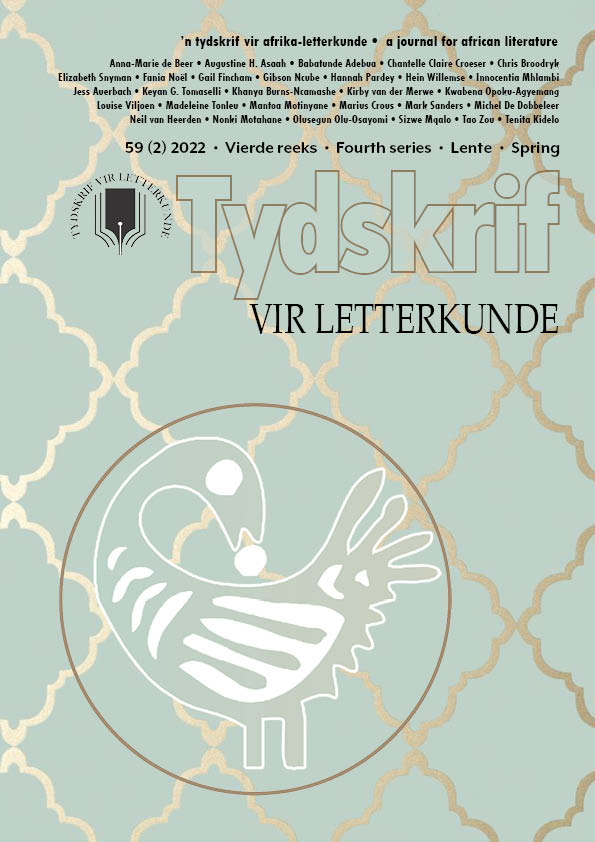Language, education, and transformation in Bianca Marais’s Hum If You Don’t Know the Words
DOI:
https://doi.org/10.17159/tl.v59i2.10942Keywords:
Soweto Uprising 1976, language ownership, Bakhtin’s Art and Answerability, implied author, narrative manipulation anticipating post-apartheid worldAbstract
In this article, I analyse Bianca Marais’s debut novel Hum If You Don’t Know the Words (2017). I consider first its relation to the historical events of the Soweto Uprising of 1976, and then examine its methods of composition. The issue precipitating the Soweto Uprising, when hundreds of black schoolchildren were gunned down by the police, was the refusal of blacks in Soweto to be taught in Afrikaans rather than in their home languages. Their revolt was both tragic and triumphant: tragic because of the sacrifice of young lives, triumphant because it marked Sowetans’ new power to insist on their ownership of language. In the spirit of this linguistic autonomy, Marais celebrates the power of language to create intercultural and intergenerational encounters, scripting dialogue which marries social diversity with linguistic elasticity. In this marriage her writing is strongly consonant with the work of the Russian linguist and philosopher Mikhail Bakhtin, whose text Art and Answerability examines the ethics of writing and helps the reader to piece together the agency of the implied author. Searching for the perspectives of the implied author reveals Marais’s political activism as well as her mastery of dialogue. Her novel belongs to the tradition created by writers in the 1970s and 1980s—when apartheid was in full force—to anticipate a post-apartheid world. Marais’s novel illustrates a political, cultural, and linguistic reinvention through its manipulation of narrative.
Downloads
References
Al-Shawaf, Rayyan. “Rousing quest for redemption in apartheid South Africa.” Toronto Star. 21 Jul. 2017. https://www.thestar.com/entertainment/books/reviews/2017/07/21/rousing-quest-for-redemption-in-apartheid-south-africa.html.
Apte, Poornina. “Hum If you Don’t Know the Words: Book Review.” Booklist vol. 113, 2017, p. 53.
Bakhtin, Mikhail. Art and Answerability: Early Philosophical Essays, edited by Michael Holquist & Vadim Liapunov. U P of Texas, 1990.
Apte, Poornina. “Discourse In the Novel.” The Dialogic Imagination: Four Essays, edited by Michael Holquist. U P of Texas, 1981, pp. 259–422.
Apte, Poornina. Problems of Dostoevsky’s Poetics, edited and translated by Caryl Emerson. U of Minnesota P, 1984.
Brink, André. “Interrogating silence: new possibilities faced by South African literature.” Writing South Africa: Literature, apartheid and democracy, 1970–1995, edited by Derek Attridge & Rosemary Jolly. Cambridge U P, 1998, pp. 14–28.
Brink, André. “Stories of history: reimagining the past in post-apartheid narrative.” Negotiating the Past: The Making of Memory in South Africa, edited by Sarah Nuttall & Carli Coetzee. Oxford U P, 1998, pp. 29–42.
Coetzee, J. M. Doubling the Point. Harvard U P, 1992.
Derrida, Jacques. The Work of Mourning, edited by Pascale-Anne Brault & Michael Naas. U of Chicago P, 2001.
Finchilescu, Gillian & Andy Dawes. “Adolescents’ Future Ideologies through Four Decades of South African History.” Social Dynamics vol. 25, no. 2, 1999, pp. 98–118. DOI: https://doi.org/10.1080/02533959908458677.
Hart, Kelly. “Writing Dialogue to Bring Your Writing to Life with Author Bianca Marais.” Muskoka411. 2 Jan. 2021. https://muskoka411.com/writing-dialogue-to-bring-your-writing-to-life-with-author-bianca-marais/.
Hawthorn, Jeremy. A Glossary of Contemporary Literary Theory: Fourth Edition. Bloomsbury Academic, 2000.
Holland, Heidi. Born in Soweto: Inside the Heart of South Africa. Penguin, 1994.
Jones, Charisse. “Moving novel opens a window into South Africa’s tortured history.” USA Today. 8 Aug. 2017. https://www.usatoday.com/story/life/books/2017/08/07/moving-novel-opens-window-onto-south-africas-tortured-history/532977001/.
Mandela, Nelson. Long Walk to Freedom. Abacus, 1994.
Marais, Bianca. Hum If You Don’t Know the Words. G. P. Putnam’s Sons, 2017.
Marais, Bianca & Bennet S. Johnson. “Author Interview: Bianca Marais.” Medium. 12 Jul. 2017. https://medium.com/the-ribbon/author-interview-bianca-marais-ce9e82e31263.
Morris, Pam. “A Glossary of Key Terms.” The Bakhtin Reader: Selected writings of Bakhtin, Medvedev, Volosinov, edited by Pam Morris. Edward Arnold, 1994, pp. 245–52.
Ndebele, Njabulo. “Memory, metaphor and the triumph of narrative.” Negotiating the Past: The Making of Memory in South Africa, edited by Sarah Nuttall & Carli Coetzee. Oxford U P, 1998.
Sachs, Albie. “Preparing ourselves for freedom.” Writing South Africa: Literature, apartheid and democracy, 1970–1995, edited by Derek Attridge & Rosemary Jolly. Cambridge U P, 1998, pp. 239–48.
Volosinov, Valentin. “Freudianism: A Critical Sketch.” The Bakhtin Reader: Selected writings of Bakhtin, Medvedev, Volosinov, edited by Pam Morris. Edward Arnold, 1994, pp. 38–48.
Watson, Stephen. A Writers Diary. Electric Book Works, 2015.
Downloads
Published
Issue
Section
License
Copyright (c) 2022 Tydskrif vir Letterkunde

This work is licensed under a Creative Commons Attribution-ShareAlike 4.0 International License.


 https://orcid.org/0000-0001-6465-6584
https://orcid.org/0000-0001-6465-6584


.png)